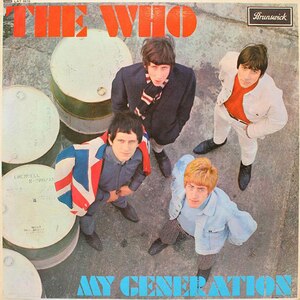Everyone is special, but if everyone is special, no one is.
I called it the Millenial's Dilemma.
| My Generation (album) (Photo credit: Wikipedia) |
(And don't cite It's a Wonderful Life
On the flip side, well, there's no way this blog is telling you anything new. It's not like I'm trying to convince you that No one has ever felt the feeeeeeels like this before!!!!!1!!!! one!!! Ennui, good books, drinks with friends, the odd existential crisis -- not only is none of this new, it's a privilege of being born where and when and who I was. It's nothing special.
So where does it all come into balance? Where's the fine line between the two extremes?
Now, I'm not convinced any generation has gotten it right. In fact, there are theories of cyclical generations that basically say that we rebel against the people two generations ahead of us (usually our parents) and thus emulate the people four generations ahead of us (usually our grandparents). In between, we're skeptical of the generation ahead of us (much-older siblings or youngish aunts and uncles) and admiring of the generation three ahead of us (older aunts and uncles and occasionally younger grandparents). From Wikipedia:
One reason why the cycle of archetypes recurs is that each youth generation tries to correct or compensate for what it perceives as the excesses of the midlife generation in power. For example, Boomers (a Prophet generation, whose strength is individualism, culture and values) raised Millennial children (a Hero generation, whose strength is in collective civic action). Archetypes do not create archetypes like themselves, they create opposing archetypes. As Strauss and Howe explain, “your generation isn’t like the generation that shaped you, but it has much in common with the generation that shaped the generation that shaped you.”
I'm an older Millenial. So I'm (in theory) less cynical than a Gen-Xer, less free-spirited than a Boomer, and I admire but would never emulate the beatniks of the Silent Generation.
It sounds pretty arrogant to conclude that I'm supposed to emulate the Greatest Generation. Then again, it also sounds kind of depressing -- they were only the Good Old Days for a pretty small subset of people.
So.
Everyone is special, but if everyone is special, no one is.
Do you feel special?





No comments:
Post a Comment